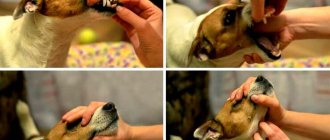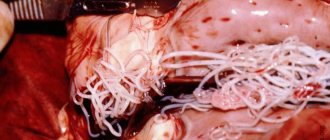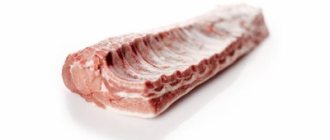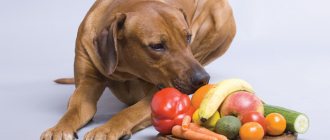The appearance of diarrhea in pets is an unpleasant event, but people often neglect it. Diarrhea in dogs does not always require treatment. It goes away easily from overfeeding, but often this disorder develops into a serious problem. Studying the causes, varieties and symptoms of this disease is an important task for a responsible dog breeder.
Causes of diarrhea in dogs
Just like in humans, diarrhea in dogs can be a manifestation of a variety of diseases.
Of course, the most common and obvious cause of indigestion is food poisoning or another malfunction of the digestive system. Due to the powerful bactericidal properties of saliva, dogs are less sensitive than other pets (particularly cats) to low-quality or stale food. Moreover, in the wild, the closest relatives of dogs, foxes and jackals (1), are generally able to feed on carrion, but it is worth understanding that most domestic dogs have gone so far from their wild ancestors that they have long ago lost all these talents. Their body has become as sensitive to food as ours. And the first reaction to any problem in the body is diarrhea or, more simply, diarrhea. There are also many breeds that are particularly demanding on the quality and type of food (for example, Chihuahuas), the same applies to white dogs, most of which are allergic.
But it should be understood that malnutrition is far from the only cause of diarrhea, and sometimes we can talk about really serious diseases, such as enteritis, hepatitis, helminthiases, the gastric form of distemper - officially this disease is called carnivore distemper (2) and others. Also, diarrhea in dogs can be a symptom of other ailments that at first glance are not related to nutrition.
“If you notice diarrhea in a dog, we always recommend seeing a veterinarian,” says veterinarian Ruslan Shadrin, “because what manifests itself as a disorder of the gastrointestinal tract does not always relate directly to it, it may be a secondary manifestation of some then another disease. And if it is viral, then it is quite serious, and the owner, unfortunately, will not help here in any way. Also, many diseases not related to digestion can manifest themselves in the form of diarrhea. This is primarily kidney damage. When toxins are not eliminated in sufficient quantities in the usual way, the body gets rid of them where it can: through the skin, through the mucous membranes, resulting in irritation and inflammation. These may also be problems of a cardiac nature: disturbances in blood pressure due to the work of the heart can also manifest themselves as various dyspeptic disorders. Also, the cause may be problems with the central nervous system, since the control of internal organs by the brain is disrupted. We can also talk about problems of organs that are associated with the digestive tract, but function outside it, for example, the liver. As a result, both the endocrine and exocrine systems of the animal’s body suffer.
Therefore, if you notice that your dog has been suffering from an upset stomach for more than a day, be sure to contact your veterinarian.
In what cases should you contact a veterinarian?
Our four-legged friends have very good health, so if you have any problems, you should contact a veterinarian. Especially if:
- diarrhea;
- vomit;
- high temperature (above 38.5°C in adult animals);
- suspicious discharge from the genitals;
- the body was covered with a red rash and blisters;
- a tumor appeared.
See a doctor urgently if the dog is hiding in a dark place, sitting with its head turned toward a corner, its head bowed, its eyes dull. Such symptoms indicate a dangerous disease. Only timely and adequate treatment will save the animal’s life.
Classification of diarrhea in dogs
Photo: Tima Miroshnichenko, pexels.com
No matter how unappetizing it may sound, but if you notice that your four-legged friend is moving differently than usual, pay attention to the nature of the stool.
If the only deviation from the norm is its consistency - it is more liquid than usual, then the reason for this is most likely a change in diet: either you recently switched the dog to a different type of food, or treated it to something unusual for it. In a word, the food did not go to waste. Draw conclusions and don’t experiment anymore.
However, if the feces have changed not only the consistency, but also the color or they contain mucus, you should be wary. They can be yellow, black, green and completely watery, and sometimes contain an admixture of blood. And here it’s worth contacting a specialist.
It is also necessary to distinguish between temporary diarrhea due to accidentally eaten low-quality food and chronic diarrhea that occurs against the background of more serious diseases.
Bloody diarrhea
If you notice that your four-legged friend is bleeding heavily, this is a reason to sound the alarm. As a rule, such manifestations signal serious disturbances in the functioning of the dog’s body.
The cause may be severe poisoning, and we are no longer talking about stale food - most likely, your dog has swallowed real poison. Also, bloody diarrhea in dogs, and especially in puppies, is a consequence of infection with an enterovirus. And here it is very important to provide timely veterinary care, since, unfortunately, the mortality rate from it is very high.
Enterocolitis (3), caused by foreign bodies entering the dog’s digestive tract, is unfortunately also a common cause of bloody diarrhea. Dogs, like small children, sometimes tend to swallow objects they play with, which in turn injure the delicate intestinal walls, causing bleeding. Sometimes such carelessly eaten little things are eliminated from the body naturally, but sometimes it’s impossible to do without the intervention of a veterinarian.
Bloody diarrhea can also be a manifestation of such a terrible disease as a tumor. In this case, the sooner you contact a veterinarian, the greater the chance of saving your friend's life.
Yellow diarrhea
If your dog's stool is yellow or yellowish in color, this is a sign that something is wrong with his liver. As a rule, this happens due to the fact that the pet is overfed with tasty handouts from the table. Fatty, overly sweet and rich foods can cause disruption of the liver and bile ducts.
If you know that you are weak in following the lead of your dog, who is a master at begging for tidbits, make a strong-willed effort on yourself and stop it. In this case, the yellow diarrhea should go away in a couple of days. But if this does not happen, take the dog to the veterinarian - most likely, we are talking about more serious disorders in the liver.
Green diarrhea
Photo: Tima Miroshnichenko, pexels.com
If you notice this color in the piles left by your dog, then first you need to observe its behavior. There are usually two reasons.
First: the dog started eating grass. There is nothing wrong with this - in the wild, all canines from time to time eat some types of plants to maintain immunity and their own health. At the same time, instinct tells them exactly which types of grass are worth eating.
Second: if you have not noticed any tendency to eat green spaces, you should be wary - in this case, the green color of the feces most likely means congestion in the gallbladder. You are unlikely to cope with this disease on your own, so without delay, take your dog to the veterinarian.
Black diarrhea
This is quite an alarming symptom that you shouldn’t turn a blind eye to. The black color of stool is given by blood that has had time to coagulate, that is, its source is most likely the upper intestines. The cause may be a peptic ulcer or tumor, so it is better to consult a veterinarian as soon as possible.
However, before you sound the alarm about the color of your pet’s feces, first remember what he ate the day before. It often happens that owners are worried about the dog’s red or black feces, but it turns out that the dog just recently managed to pluck raspberry or blackberry bushes in their garden.
Infectious diseases with diarrhea
This group includes inflammation of the gastrointestinal tract caused by bacteria, viruses, parasites:
- Foodborne toxic infections. This word hides disorders associated with opportunistic bacteria - clostridia, campylobacter, and less commonly Escherichia. They live peacefully in the intestines of a healthy dog. As the population increases, the release of toxic products increases. The animal begins to have watery greenish diarrhea and sometimes vomit. Bacteria enter the body along with contaminated meat and dairy products.
- Intestinal parasites. Worms mechanically destroy mucous membranes. Microtraumas bleed, and helminth waste products are toxic to dogs. When examining stool, mucus, streaks of blood, and traces of parasites are found - eggs, larvae, adults.
- Parvovirus enteritis. The first signs of the disease are complete refusal to eat and drink and debilitating vomiting with mucus. After 6 – 24 hours, diarrhea begins. The stool is first watery, yellowish-gray, then brown, dark red, foul-smelling, sometimes with traces of blood.
- Coronavirus enteritis. The disease develops as a parvovirus infection, but dogs tolerate it more easily.
- Adenoviral hepatitis. The dog becomes lethargic, the lymph nodes and liver enlarge, the cornea of the eye becomes cloudy, severe vomiting and bloody diarrhea begin.
- Plague of carnivores of intestinal form. The symptoms of the disease resemble parvovirus, but the animal does not refuse water. Initial signs are vomiting and diarrhea with white or yellowish foam.
- Piroplasmosis or babesiosis. The disease is carried by ixodid ticks. The dog's temperature rises sharply to 40 degrees, the color of the urine changes from dark yellow to brown. On days 2–3, yellow vomiting and diarrhea with blood and mucus begin.
Unvaccinated animals under one year of age are more likely to suffer from viral infections. Puppies under 5 months often die. The only way to protect your pet is to vaccinate it on time.
Treatment of diarrhea in dogs
Photo: Ferrari, globallookpress.com
If you notice that your dog often asks to go to the toilet, then be patient and watch it for 24 hours. Keep your pet on a diet: for the first day it is better to abstain completely from food, but you should give as much boiled water as possible. If the animal’s condition does not worsen - it does not become lethargic, inactive, and the stomach does not hurt when pressed, begin to slowly offer it boiled turkey or strictly skinless chicken breast, liquid low-fat broth, or rice water. In short, care for your tailed friend the same way you would a person who has suffered food poisoning. However, if his condition worsens within a day, it is better to take the dog to a veterinary clinic, where all the necessary tests will be carried out, a correct diagnosis will be made and a treatment strategy will be developed.
The main thing is, do not try to treat your pet with folk remedies, which are most often very questionable and can do more harm than good.
What to do if you are injured
When your dog sprains a ligament or gets a bruise, reduce the load. Walk with her calmly, slowly, don’t let her run, especially don’t throw sticks down the slides.
If your dog cuts his paw, wash it with an antiseptic and bandage it. If there is a lot of bleeding and the bandage does not stay on, buy a fabric-based adhesive plaster. It sticks well and does not slip off the wool. Do not apply it to a bare wound. First, cover it with a bandage soaked in iodine.
For any fracture, secure the damaged area with a bandage or splint, then immediately contact a veterinarian. Don't forget to wear a muzzle - if the pain is severe, the animal may not control itself. The doctor will apply a cast and prescribe treatment - painkillers, sedatives, as well as drugs that improve tissue regeneration.
The dog should stay at home. Movement should be kept to a minimum, only going outside to go to the toilet. Carry a small dog in your arms. As your pet recovers, it will become increasingly active. Stay strong. Limit jumping and movement.
Diagnostics
It should be understood that unless you are a veterinarian yourself, it is better not to take responsibility for making a diagnosis. When your dog's diarrhea does not go away for several days, you should consult a specialist.
“We will definitely conduct a full examination, take the main indicators: temperature, pulse, breathing, etc.,” explains veterinarian Ruslan Shadrin. – Plus, at the same time, we ask the owners about the methods of keeping, feeding and living conditions of the animal, and treating it from parasites. And this helps us make the right diagnosis and prescribe the right treatment. Because self-medication does not always give the desired result. And sometimes we have to treat a dog not for viruses, but for the consequences of such folk therapy, in particular from alcohol poisoning, which owners often give to their pets, trying to cure them of poisoning or distemper.
When going to your appointment, you should bring your pet's feces with you for analysis, which is necessary to identify the cause of the disease. Also, the clinic will certainly perform an ultrasound of the animal’s abdominal cavity, and, if necessary, an X-ray examination, as well as a blood test. If pathologies in the gastrointestinal tract are not identified, veterinarians will examine other organs, since stomach upset can be caused by a variety of reasons.
Modern methods of treatment
Treatment of diarrhea in dogs is carried out after an accurate diagnosis has been made. Also, in addition to the main therapy aimed at eliminating the causes of the disease, a set of measures is carried out to replenish the supply of moisture in the body, which is lost in large quantities during diarrhea. Anti-inflammatory drugs and probiotics are also prescribed, and an individual diet is developed. During the recovery stages, the dog also receives immunostimulants to help its body recover faster.
In severe cases, when the cause of diarrhea is a foreign body in the intestines or a tumor, surgery is prescribed. It is performed under general anesthesia in the presence of an anesthesiologist, so that the health and life of the four-legged patient is not in danger.
Forms of the disorder
There are a number of varieties of the disorder, thanks to which it is possible to determine why a dog has diarrhea.
- Acute diarrhea is characterized by the duration of loose stools (2 weeks). If additional symptoms did not appear (lethargy, temperature), the disorder could be caused by the consumption of dairy and fatty products, poor quality food, perhaps not suitable for the breed. This disorder can be easily corrected on your own, but if the result is negative (diarrhea has not gone away or worsened on the 3rd day of treatment), a visit to the veterinarian is required. Small decorative breeds such as Chihuahuas have sensitive stomachs and are often susceptible to this disorder.
- The second form of acute diarrhea is typical for unvaccinated puppies. It is caused by the presence of various diseases in the body - from enteritis to plague. The cause is poisoning with various poisons and chemicals. An urgent visit to the veterinarian is necessary.
- Chronic diarrhea is characterized by loose stools lasting more than 2 weeks. This form manifests itself as a result of the appearance and development of chronic diseases in the dog (pancreatitis, gastritis, salmonellosis, dysbacteriosis, the appearance of helminths, etc.).
Preventing diarrhea in dogs at home
Photo: pixabay.com
Since the most common cause of diarrhea in dogs is improper feeding, it is necessary to monitor your pet’s menu. You need to choose the right diet for him and not deviate from it. Under no circumstances should you overfeed your dog - handouts from your table will do nothing but harm. If you are a supporter of natural food, make sure that your tailed friend’s diet is balanced and that the food is fresh and cooked.
From puppyhood, wean your dog from the habit of picking up anything on the street - through such street “delicacies”, infection with parasites or pathogens of various infectious diseases, such as enteritis or distemper, most often occurs.
And, of course, make sure that your dog is less likely to encounter stressful situations - do not shout at him and do not raise your hand under any circumstances, because nervous shocks often affect the state of the body of our smaller brothers.
Popular questions and answers
We talked about the treatment of diarrhea in dogs with veterinarian Ruslan Shadrin .
Can diarrhea in dogs be dangerous for humans?
As a rule, the causative agents of canine diseases are not transmitted to humans, however, if we are talking about helminth infections, then a person can become infected with some of their species.
Is it possible to cure diarrhea in dogs at home?
It all depends on the reason. If you know for sure that the dog has eaten stale food or is simply too full, you can give it absorbents and keep it on a strict diet for several days. However, if the reason is not known to you for sure, it is better to consult a specialist.
Why is diarrhea dangerous in dogs?
In addition to the fact that it is often a symptom of serious disorders in the functioning of the animal’s body, diarrhea leads to such unpleasant consequences as dehydration, exhaustion, and lethargy. Not to mention that if the dog lives in an apartment, diarrhea can become a serious problem for the owners, because they will not be able to take their pet outside every half hour.
Why can diarrhea be accompanied by vomiting?
Most often this happens if the cause of diarrhea is food poisoning or foreign bodies entering the digestive tract. The body is simply trying in every possible way to get rid of the foreign object or toxins. As a rule, vomiting occurs first, but when toxins reach the intestines, diarrhea also follows.
Does activated charcoal help with diarrhea in dogs?
Activated carbon acts equally effectively on the body of both humans and animals: 1 tablet per 10 kg of weight. However, it should be understood that charcoal will only be effective if we are dealing with food poisoning. But, if you see that there is no improvement, be sure to contact your veterinarian.
How to choose a veterinarian
Important: ask in advance for opinions about the veterinarian to whom you entrust your dog, find out about his experience. In the practice of any doctor there are failures, but in most cases the reviews should be positive.
If there is only one veterinarian in your area with bad reviews, if the case is critical, contact him anyway. Maybe in your case he is competent. When you have time, find a doctor from another region in advance and call him. Many veterinarians visit a sick pet at home. If this is not possible, take the dog to him.











